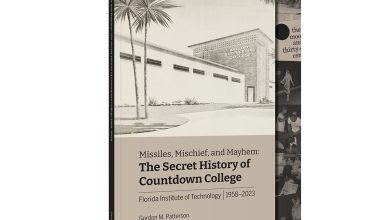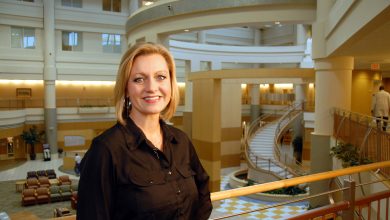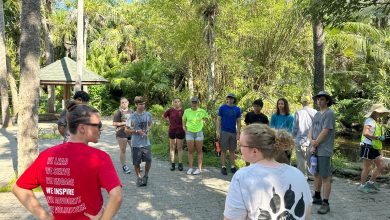Spotlight on Dr. YJ Sohn: Connoisseur of Crisis Communication
This week, the faculty spotlight is on Dr. YJ Sohn! Prior to joining the Department of Humanities and Communication, Dr. Sohn worked as Associate Editor for a business monthly published in Korea. Her interviewees include the former President and Novel Prize Laureate Kim, Dae-Jung, Vice Prime Minister Han, Seung-Soo, and many industrial and economic ministers, as well as CEOs and executives of Korean and multinational companies. Before pursuing a journalism career, she worked as an event planner and business consultant. Her past clients include multinational companies such as Goodyear Tires and Lipton.
What classes do you teach at Florida Tech?
Strategic communication; Intro to public relations; research methods; intro to visual communication; layout & design
How many years have you taught at FIT?
4 years
How many years have you been a teacher, and where have you formerly taught?
I taught at the University of Georgia as an adjunct for two years.
Do you have any awards, honors, publications, or accomplishments you’d like to share?
Sohn, Y. & Lariscy, R. A. (forthcoming). Understanding Reputational Crisis: Definition, Properties, and Consequences. Journal of Public Relations Research
Sohn, Y. & Lariscy, R. A. (forthcoming). A “Buffer” or “Boomerang”? — The Role of Corporate Reputation in Bad Times. Communication Research
Sohn, Y. & Lariscy, R. A. (2012). Resource-based crisis management: The important role of the CEO’s reputation. Journal of Public Relations Research, 24(4), 318-337.
Sohn, Y. (2010). Toward Building the Relationships-Reputation Integrated Model. International Journal of Integrated Marketing Communications, 2(2), 19-34.
Lariscy, R.A., Avery, E.J., & Sohn, Y. (2010). Health Journalists and Three Levels of Public Information: Issue and Agenda Disparities? Journal of Public Relations Research, 22(2), 113-135
Sohn, Y., Lariscy, R. A. & Tinkham, S.F. (2009). Negative news and financial decisions: The impact of CEO reputation. International Journal of Strategic Communication, 3, 1-18.
Avery, E.J., Lariscy, R.A., & Sohn, Y.J. (2009). Public Information Officers and Journalists Perceived Barriers to Providing Excellent Health Information. Health Communication, 24, 327-336.
Avery, E.J., Lariscy, R.A., & Sohn, Y. (2007). Public Relations Practitioners Relationships with Media and Each Other as Moderators of Excellent Health Information and the Local Public Health Agenda. Public Relations Journal, 1, 1-21
Those mentioned above are journal publications. It is hard to mention all conference papers due to the limit of space. But I’d like to mention two papers, which were selected as the top paper:
Sohn, Y. (2006). “Internet and uses and gratifications research: Opportunities, challenges and new research agendas” Presented to the Communication Theory and Methodology Division at the annual meeting of the Association for Education in Journalism and Mass Communication, San Francisco, August. TOP THREE STUDENT PAPER.
Lariscy, R.A., Avery, E.J., & Sohn, Y. (2007). Relationships Between Public Information Officers and Health Journalists and Barriers to Excellent Health Stories. Presented to the Tenth Annual International Public Relations Conference, Miami, FL, March. TOP THREE PAPER.
What are your particular research interests?
So far my research has been focused on corporate reputation management and crisis management. Currently my research interest has shifted toward how people develop the meanings of things/events and how the meanings are spread through the public sphere. In addition, I have great interest in research methods and theory development.
How did you first become interested in your area of research?
I have developed my original research interest when I worked as a business journalist in Korea. I often heard from my readers that they invested in companies that I covered and made fortunes. Then I was curious about what factors in my articles led people to the investment or economic decisions. That’s why I first developed my research interest in building and managing corporate image/reputation through communication. Moving a step further, I came to have a great interest in delving into the meaning structure that people in a society/culture create and share of things (e.g. companies, brands, products, etc.) and/or events (e.g., crisis events, consumption of products, social activities, etc.), as well as the process in which a perspective or interpretation out of multiple meanings becomes dominant.
What advice do you have for budding scholars?
I think that I am also still one of budding scholars. Therefore, I’d like to share what I say to myself everyday.
Honestly speaking, it is very difficult for a scholar to avoid facing the so-called “number game” – i.e., publishing as many articles in academic journals as possible. I am also under pressure of getting more papers published. Under the system, it is very hard to read about broad topics, and one comes to do research on a very narrowly focused, functionally fragmented area by isolating his/her research area from the big picture (because it is easier to make outputs in this way). This will result in churning out meaningless papers, if I exaggerate, like “The discourse on the meaning of the death of the father of secretary of a Republican candidate in a small town in West Virginia.” Of course, it is important to be an expert in one specific area. However, without connecting his/her field with a larger picture, he/she will hardly be able to make a good researcher. Therefore, before doing research, I suggest to think about why this research is important, what I want to achieve through this, how I can contribute to our society with this research, etc.
What is your favorite Florida Tech memory?
I have been writing a new good memory everyday ever since I started working here at Florida Tech. Everyday is exciting and fun.
What do you like to do in your free time?
I have a dream – a dream that, in 10 years, I will have the showcases of my books, the exhibition of my photos, and mini-piano solo recitals. I am not good at none of these– yet, I say. To make my dream come true, though, I go traveling time to time for taking pictures and take piano lessons regularly, in addition to preparing for lecture, doing research and writing papers. Between times, I read books – mostly about philosophy, history, art, and other topics. Still I have free time, I play wii for working out.
If I could live in a different time, I would live in…
I would like to live in Vienna, Austria in the early 20th century. The turn of the century in Vienna seems to me the most exciting and romantic era. Then I would have gone to the parties hosted by the Wittgensteins (then I would have listened to the first performance of Brahms’ string quintet) and enjoyed conversations with young Ludwig Wittgenstein. I also would have hung out with the iconic artists of the day, such as Klimt and my favorite Egon Schiele at a café designed by Adolf Loos. Who know? I might have a chance to say hello to Freud.
My favorite book is…
Plato’s The Republic. People may think this book would be a difficulty philosophy book. But it has everything about life in it. It is about how to live well, what is the good life, what is the social justice, how to educate our citizens, etc. I recommend this book especially for those who feel miserable or face hardship. This book will give peace in mind and wisdom.
The last movie that I saw (and enjoyed!) was…
Men in Black 3. I watched it on TV. I got my English name “YJ” after watching the first MIB. The MIB series have got all the factors that I like about movies – action, comedy, SF, fantasy, and animation (these are the only five genres of movies that I watch).





